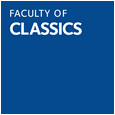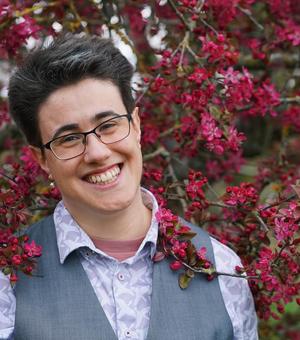Dr Martina Astrid Rodda
Qualifications: BA, MA UniPI/SNS Pisa, DPhil Oxon
ORCID: 0000-0002-5214-8037
Link to college page: https://www.merton.ox.ac.uk/people/dr-martina-astrid-rodda
Academic Background
My main current interest is disability and gender in Greek literature. My postdoctoral research project focuses on the representation of disabled mythical characters in the works of Lucian of Samosata, how it reflects changes in the ancient world’s view of disability, and how the characterisation of disability intersects with gender, class, and ethnic identity.
My doctoral thesis (which I’m currently revising for publication) was a study of formulaic variation in early Greek hexameter poetry, conducted using quantitative methods and drawing on contemporary linguistic approaches such as Construction Grammar and Distributional Semantics. I used these approaches to identify patterns of variation that are unique to early Greek epic formulae and do not occur in later hexameter poetry.
My past and current research projects have a strong interdisciplinary outlook, with my current interests engaging closely with current research and activism in Disabilities Studies. I have co-organised the 'Neurodiverse Classics: Constructive Connections' panel at the 2022 Classical Association Conference (Swansea, 8-11 April 2022). I’m also still working on the dialogue between current linguistics approaches (especially Discourse Analysis and Construction Grammar) and traditional philology. I maintain active interests in Hellenistic epic and Greek theatre, as well as Jewish literature and culture.
Disability Studies, Imperial Greek literature, Construction grammar, Homeric formulae, formula studies
Greek Literature options for Mods and Greats. I have past language teaching experience in both Latin and Greek.
Full Publications:
Selected Publications:
[submitted] “Oral, post-oral, a secret third thing? Reassessing early Greek formularity from a quantitative perspective.” Conference proceedings: The Transmission of Poetry in ancient Western Asia and the Eastern Mediterranean.
[submitted] “Antoine Meillet et la langue homérique: Au-delà du «Parryisme».” Études de lettres, forthcoming December 2023.
Rodda, M.A. 2023. “Repetition as a meaningful element - (D.) Beck (Ed.) Repetition, Communication, and Meaning in the Ancient World. Orality and Literacy in the Ancient World, Vol. 13. (Mnemosyne Supplements 442.)” The Classical Review 73: 7–10. https://doi.org/10.1017/S0009840X22002621.
Rodda, M.A., and McGillivray, B. 2022 [pre-print]. “Computational Valency Lexica and Homeric Formularity.” https://arxiv.org/abs/2208.10795. [awaiting publication in conference proceedings]
Rodda, M.A., Probert, P., and McGillivray, B. 2019. “Vector space models of ancient Greek word meaning, and a case study on Homer.” TAL: Traitement Automatique des Langues 60 (3): 63-87
Battezzato, L., and Rodda, M.A. 2018. “Particelle e asindeto nel greco classico.” Glotta 94: 3-37
Rodda, M.A., Senaldi, M.S.G., and Lenci, A. 2017. “Panta rei: Tracking semantic change with Distributional Semantics in ancient Greek.” Italian Journal of Computational Linguistics 3.1: 11-24
Rodda, M.A. 2016. “L’Inno Omerico ad Afrodite (V) e la cronologia relativa dell'epica greca arcaica.” In Di Donato, R. (ed.), Comincio a cantare. Contributi allo studio degli Inni Omerici, 83–101. Anthropoi. Studi e materiali di Antropologia storica del mondo antico 13. Pisa: ETS




